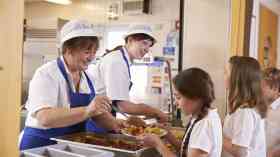
The importance of school food in the spotlight
With free school meals in the national spotlight, LACA’s national chair Stephen Forster sets out how LACA proposes to ensure that children are fed, whether in term time or the holidays. In addition, there is an update on National School Meals Week and the launch of LACA’s new Allergens Guidance.
The issue of free school meals is at the centre of political, media and public attention, following the decision last month by the Government to reject calls to extend a voucher scheme for children to receive free school meals over the half term and winter months.
Subsequently, over the October Half term, hundreds of businesses, councils, and individuals came together to feed hungry students during the week, supporting the campaign started by the Manchester United and England forward Marcus Rashford.
As Marcus Rashford so eloquently said, no child should ever go hungry. And there are now more children entitled to free school meals than ever before. According to the latest figures from the Food Foundation, 2.2m children are now registered for free school meals, with 900,000 of these being registered since the pandemic began.
When it comes to feeding disadvantaged children, LACA’s members are at the heart of this: we have the collective expertise, knowledge, tools – and the passion – to do whatever we can to support the poorest families during these difficult, and uncertain, economic times. As the representative body for the school meals industry, we believe that our members are best placed to deliver this.
LACA Solution
Throughout the pandemic our members have been focussed on feeding children, including those entitled to free school meals and children of key workers. More recently, LACA have worked with the Department for Education and Public Health England to provide guidance on food parcels for children who are entitled to free school meals but are self-isolating. Thousands of these healthy and nutritious food parcels have been provided by our members to children across the country.
As England enters a second national lockdown, LACA have recommended a three-point plan to the Government to ensure that there is a sustainable solution. Firstly, extending term-time free school meals to all children whose parents are on Universal Credit. This is a key recommendation from the National Food Strategy interim report, and one which would ensure that no child falls through the gap as the Covid-19 pandemic puts further pressure on family finances.
Secondly, The Government should work with LACA and our members to provide food parcels to children during the Christmas holiday. The Government is under immense political pressure to provide extra funding for free school meals over the holidays to ensure no child goes hungry. We believe that the best way to do this is to mobilise LACA’s extensive network of school caterers to provide food parcels that are in line with the guidance we have produced with the Department for Education. This will mean that not only will hungry children be fed; they will receive a range of ingredients to prepare nutritious and balanced meals that are imperative for good child health.
Thirdly, the Government should continue to work with LACA to deliver our healthy food parcels to disadvantaged children during term-time. Our members are going above and beyond to ensure children who are required to self-isolate do not go without a healthy, balanced diet.
We have had positive discussions on these three recommendations to date. However, we know that there is no comparison to the nutritional benefits a child gets from a professionally prepared, high quality, hot school lunch and that food parcels only go so far. And for too many children, the hot meal they receive at school is often the only one they will get.
Hot’ober and National School Meals Week 2020
LACA launched a campaign called “Hot’ober” to help school caterers return to serving hot cooked meals as soon as it is practicable and safe to do so. With social distancing in place many schools have opted for cold lunches to ease the now more complex logistics of feeding pupils during the lunch break – a solution that has worked well during the summer months.
We are continuing to encourage caterers to bring back hot meals in whatever way they can, whether that is through a traditional tray service or grab and go options. We were delighted that the Minister for Children and Families endorsed the campaign and outlined her support for another of LACA’s key events in the year, National School Meals Week, in a recent letter to all schools and academies.
This year’s National School Meals Week, which takes place from 9th-13th November, has added significance. It is now more important than ever that students are back enjoying hot school meals to fuel healthy minds, whilst supporting local British Food. It is also an opportunity to highlight the incredible role that our school chefs play day in, day out. They are key workers, who deserve to be celebrated.
Alongside this important message, the week will have five educational themes to encourage uptake. On Monday, we will have a “go meat free” day which many caterers are already promoting once a week on their menus. On Tuesday, we will have the “School Meal Oscars” focussing on a day of student’s favourite meals where parents and children can submit their favourite school meals and dessert to be served at school. On Wednesday, we will be collaborating with Food for Life for National Roast Dinner Day. On the Thursday, the focus will be on the Great British School Lunch with support from Love British Food, with menus packed with British favourites. On Friday, we conclude by asking parliamentarians to present certificates online to catering teams and record a message of support, to thank the vital role that caterers play to keep children fed.
Allergens Launch
Alongside both our Hot’ober and National School Meals Week campaigns, we were also proud to launch our Allergens Guidance and Risk Analysis Process to support schools, caterers and pupils understand best practice with regards to managing allergens safely.
Over the last year, LACA has led the way in making allergens awareness a core part of menu development. Dealing with special diets and food intolerances is one of the biggest challenges that we have in our industry. In the UK, an estimated 7% of children suffer from a food allergy. While some reactions can be treated, some can be more severe or even fatal.
Currently, more children are presenting with allergies and requests for support and this has increased approximately five-fold since 2014. Children cannot take responsibility for managing their allergies. The legislation focuses on providing accurate allergen information; however only 39% of medical diet requests are for the 14 legislated allergens. There is also the expectation that caterers should feed children regardless of whether allergies pose a safety threat.
LACA therefore worked to generate a nationally agreed guidance document for the management of allergens in education catering, the first of its kind. The guidance document was also presented to leading allergen charities and the Department for Education for their insight. The guidance is now available on the LACA website and in the public domain. The analysis process is offered to members only.
Looking ahead
The Covid-19 pandemic has undoubtedly highlighted the social, economic and educational importance of school food. The Government has an opportunity in the Comprehensive Spending Review later this month to underline its commitment to the future of the school meals service and allocate more funding.
LACA will continue to campaign to ensure that our recommendations in our 3-point plan are heard at the highest level of Government. We would welcome the wider Education Business community’s support on this. Despite all the challenges faced, our members will continue to work hard to renew the service in a Covid-secure way in schools this Autumn and Winter.
Latest News
31/10/2025 - 10:12
A growing number of UK children are now eligible for Free School Meals (FSM), yet most still aren’t taking advantage of them on a daily basis, new research reveals.
30/10/2025 - 01:28
In the wake of the Raac crisis, the DfE spent £5 million on research into the condition of school buildings, which is due to conclude in spring 2026.
30/10/2025 - 01:09
Malmesbury Primary School in Wiltshire has submitted plans for a major expansion, funded by entrepreneur James Dyson.
30/10/2025 - 00:55
Monday's Every Pair Tells a Story campaign to protest to highlight the national crisis in SEND provision.
29/10/2025 - 09:19
Estimated data from the Department for Education reveals that 470,000 pupils under 16s use local authority funded transport to get to school.







